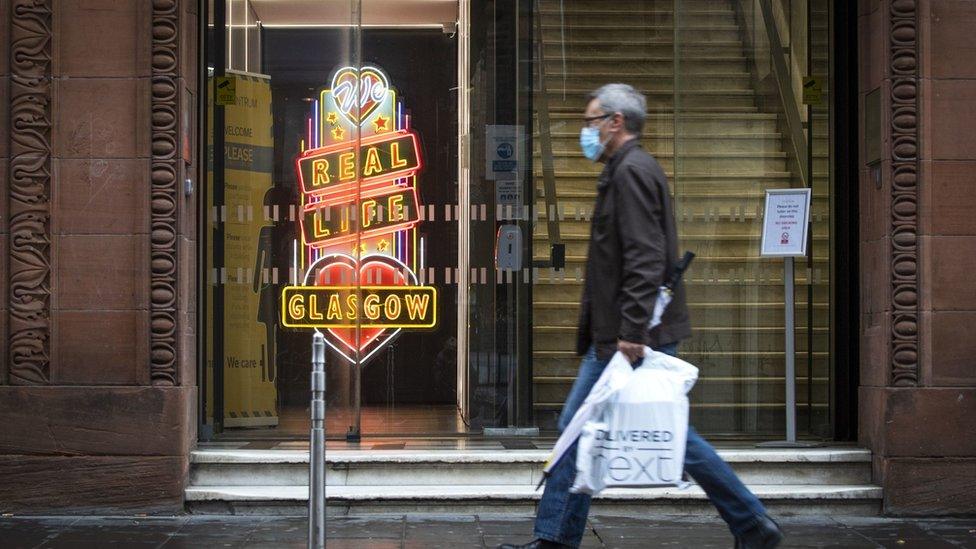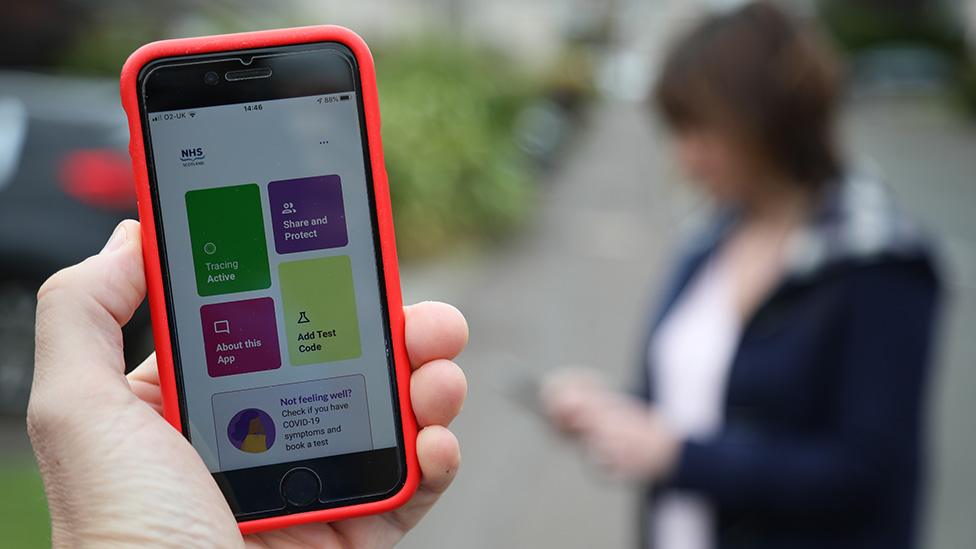Coronavirus in Scotland: Covid cases hit four-month high
- Published

Daily coronavirus cases in Scotland have hit a four-month high, the latest Scottish government statistics show.
A total of 221 people tested positive for the virus in the past 24 hours - the highest daily figure since 8 May, when there were 225 positive tests.
However there were far fewer tests being carried out at that stage of the pandemic, meaning many people with the virus did not appear in the statistics.
The latest figures, external also show there were no more confirmed Covid deaths.
They also reveal:
18,240 tests were carried out (compared to 4,732 on 8 May)
Eight people were in intensive care with Covid-19
261 people were in hospital with a confirmed case of the virus
It comes as tougher coronavirus restrictions are imposed on people in North and South Lanarkshire.
They are not allowed to meet other households in their homes, or visit other peoples' homes.
Similar measures are already in place in Glasgow, East and West Dunbartonshire, Renfrewshire and East Renfrewshire.
The daily statistics also show that 106 of the positive tests were recorded in the Greater Glasgow and Clyde health board area.
In the NHS Lanarkshire area there were 48 new cases, and there were 35 in Lothian.
There was at least one positive case in each of the mainland health board areas.

On Twitter,, external the first minister urged people to follow public health advice.
"More than ever we must remember that what we do as individuals just now affects the wellbeing of everyone. Let's look after each other," she added.
'Not good news'
And Prof Jason Leitch, Scotland's national clinical director, admitted that 221 positive cases was a "big number compared to what we have got used to".
"As we've opened up it's inevitable the virus has found new ways of getting from household to household - and that's all it wants to do; it wants to find new people to infect," he told BBC Scotland.
"You've seen us take fairly harsh interventions and restrictions to some areas - that won't work instantly. It will need days, weeks, even a number of weeks, to show in the numbers.
"It's not good news, but it's what we expected. The virus doesn't work in 24 hour cycles - it works in two to three week cycles."
Prof Leitch acknowledged that many people may be starting to feel "lockdown fatigue" more than six months into the crisis.
But we can't "simply wish [coronavirus] away", he added.
The increase in cases in recent weeks has led to a change in the rules when it comes to groups meeting.
Until now, eight people from three households had been allowed to meet indoors in Scotland, and up to 15 from five households outdoors.
But from Monday, this will change to six people from two households and will apply both indoors and outdoors in Scotland, external - including in homes, gardens, pubs and restaurants.
Milestone for Scotland's contact tracing app

On Saturday, Scotland's contact tracing app, Protect Scotland, had been downloaded 800,000 times.
The app, which was launched earlier in the week, uses Bluetooth technology to alert users if they have been in prolonged close contact with someone who has since tested positive for Covid-19.
An Oxford University study claimed that even with an uptake of just 15%, a contact tracing app can drive down infections by about 8% and deaths by about 6% - if it is part of a manual track and trace strategy.
Nicola Sturgeon said, external it was a "big milestone", adding that it amounted to approximately 20% of the adult population.
"We know it will make a difference at that level". she said, "but the more who use it, the bigger that difference will be".
She urged Scots to encourage their friends and family members to download the app, external.

BACK TO SCHOOL: Can a school insist on a Covid test?
LOCKDOWN EASING: What changes next - and when?
